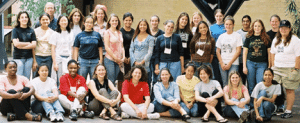Forty-four high school girls encountered electrical engineering this summer in a day camp hosted by the Cullen College of Engineering at the University of Houston. GRADE Camp (Girls Reaching and Demonstrating Excellence in Engineering) ran for two one-week sessions this summer, June 9-13 and June 16-20.
At GRADE Camp, a select group of girls learned to design, build and program a Lego Robot to autonomously maneuver through a maze. The girls were guided through an original curriculum designed largely by Electrical Engineering Professor John Glover. Class time was broken up with games that subtly reinforced principles the girls learned in lecture and in the robot lab.
Jenny Ruchhoeft, GRADE program director, wanted this group of girls to feel comfortable with electrical engineering material. That they did. By the end of GRADE camp, the girls were scribbling down phone numbers and e-mail addresses and promising to keep in touch with these new friends who share their interest in engineering.
Elizabeth Hendley, a GRADE Camp mentor affiliated with the Society of Women Engineers (SWE), says, “These girls will be lucky when they are trying to decide about colleges because they already know other women who identify with their desire to be engineers. Here at camp, they have met other girls who are good at math and science, which is something I didn’t really have in high school.”
Learning at GRADE Camp was as interactive and tactile as the organizers could make it. For example, the girls had flashlights that were outfitted with voltmeters and ammeters while they were learning about voltage and current. After these sessions, they were invited to make jewelry out of transistors, electrical wires and circuits. The girls went home that day with necklaces, earrings and other creations made almost entirely of electrical components.
Chidiogo Madubike, a lead SWE mentor and a Ph.D. student in electrical engineering, says, “Dr. Dave [Shattuck] stood on a table in one lecture and dropped books from the ceiling to demonstrate Galileo’s principle. That is something you will not forget easily.
“In GRADE Camp we are not trying to teach these girls as if they were college freshmen already. Rather, we are here to put pictures in their heads. They will never think of flowcharts without thinking about their peanut-butter-and-jelly-sandwich worksheet. Their memory of electromagnetics will be tied to Dr. (Stuart) Long’s illustrations.”
On the last day of camp, the girls were given the opportunity to present their projects to an audience of parents and teachers. The campers had a chance to display more than just their robots. They had been taught that communication skills are essential to an engineer’s work, and they learned about the skills necessary to give an effective presentation.
The groups of girls from the two different weeks of camp showed some remarkably different traits, but all the girls eventually showed the same enthusiasm for their projects.
“One thing that blew every one of us away was the 100-percent attendance at camp from the very first day,” says Madubike. “Every girl who showed up for GRADE Camp came back every day of the week. No one skipped a single class or even showed up late.”
An observer might attribute a great amount of the energy in the classroom and robotics lab to the students’ mentors, female engineering students affiliated with the SWE on campus.
The mentors conducted a trial run through all the GRADE Camp material, and they effectively transmitted their enthusiasm to the students. At least one student was so impressed by her SWE mentor that she requested that her mentor continue to work with her on an academic school project for the following year.
Hendley was thrilled when several of the girls in her mentor group asked for her contact information. “I didn’t want to just push my e-mail address on them, so it was very gratifying that they asked for it themselves.”
Madubike and Diana De la Rosa, another lead SWE mentor and a Ph.D. student in electrical engineering, taught sessions about motors and generators. “All the professors were teaching what they teach particularly well,” Madubike says. “So when we get passionate about a subject, it is because we love what we are doing. I think the girls picked up on that.”
Ash Nguyen, a junior at Bellaire High School, attended the first week of GRADE Camp. “I saw Chidiogo and Diana up at the front of the room teaching us and I thought, ‘I could do that too!’ Now I know that there are women in engineering and there are organizations like SWE to support them,” she says.
GRADE Camp is the result of a Texas Technology Workforce Development grant through the Department of Electrical and Computer Engineering. GRADE Camp is the recruiting portion of the grant. Redshirt Camps, Circuits Workshops and Electromagnetics Workshops, which are held throughout the school year, represent the retention portion of the grant.
In addition to the immediate academic and social benefits of attending camp, an automatic $1,000 scholarship is offered by the Cullen College of Engineering to any young woman who completes GRADE Camp and later chooses to study electrical or computer engineering at the college.
